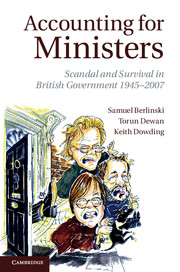Book contents
- Frontmatter
- Contents
- List of figures
- List of tables
- Preface and acknowledgements
- 1 Introduction
- 2 Managing the cabinet: principal–agent relations in government
- 3 The structure of British government
- 4 Who serves in government and how long do they last?
- 5 The prime minister and cabinet
- 6 Performance measures and forced exits
- 7 Ministerial performance and tenure
- 8 Conclusion
- References
- Index
7 - Ministerial performance and tenure
Published online by Cambridge University Press: 05 April 2012
- Frontmatter
- Contents
- List of figures
- List of tables
- Preface and acknowledgements
- 1 Introduction
- 2 Managing the cabinet: principal–agent relations in government
- 3 The structure of British government
- 4 Who serves in government and how long do they last?
- 5 The prime minister and cabinet
- 6 Performance measures and forced exits
- 7 Ministerial performance and tenure
- 8 Conclusion
- References
- Index
Summary
In Chapter 4 we demonstrated that the background characteristics of ministers help explain the length of their ministerial service. For example, observable traits (gender, age) and verifiable facts about the background of those taking office (experience, education level) allow us to predict the length of their ministerial spell relative to others with different characteristics. The fact that we observe and measure these traits before ministers enter office, and that we include a range of measures that capture fixed characteristics of the governments that ministers serve, allows us to be reasonably confident that the parameters of interest are well identified. That is, we can be confident that the effects we observe are causal: some ministers serve longer than others because of their characteristics and not, for example, because they served as part of a particular administration or because specific incidents determine tenure. To be sure, some ministers leave office due to specific events occurring, but our fixed effects control for those factors allowing us to see the effects of ministerial characteristics outside of those other influences.
Our micro-level data on British cabinet ministers has thus allowed us to provide some answers to fundamental questions in British politics. Attaining ministerial office is the pinnacle of a political career. Therefore we can assume that upon attaining high office, ministers desire longer rather than shorter spells.
- Type
- Chapter
- Information
- Accounting for MinistersScandal and Survival in British Government 1945–2007, pp. 150 - 172Publisher: Cambridge University PressPrint publication year: 2012



